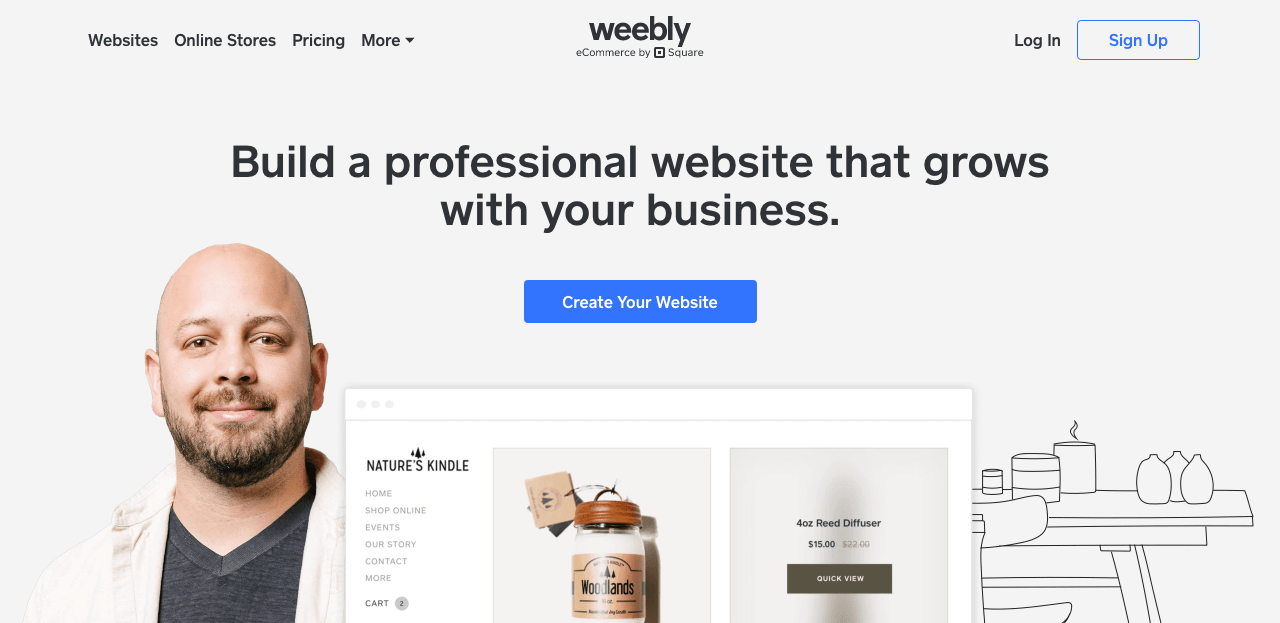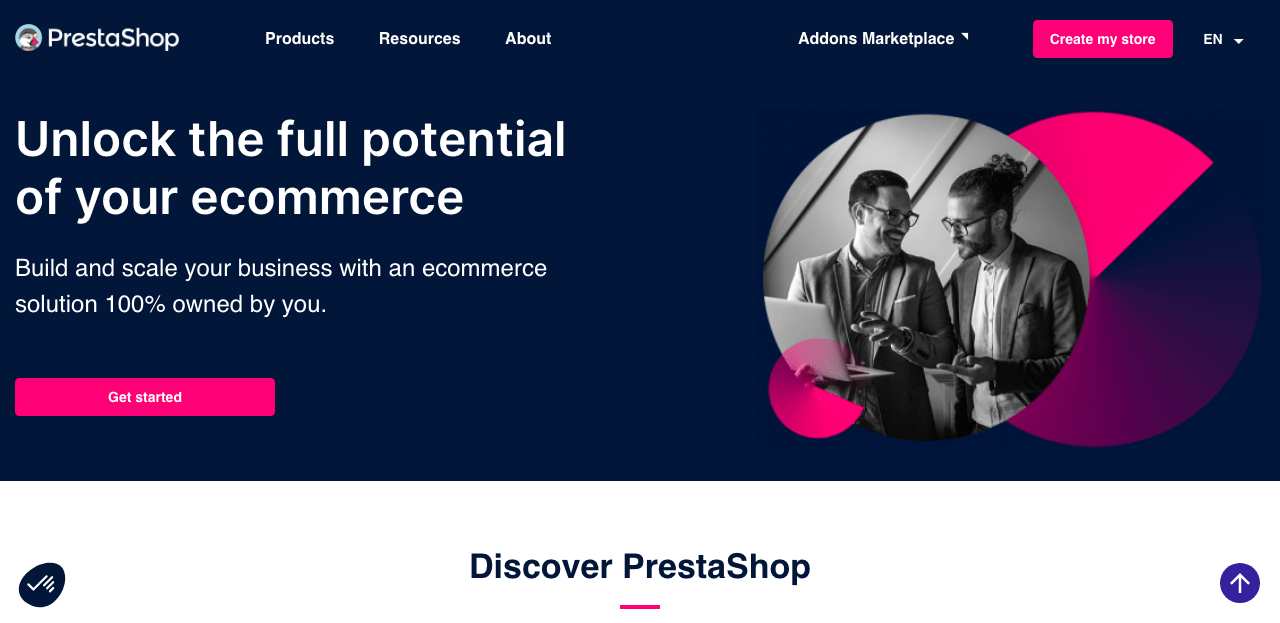Are you an aspiring eCommerce entrepreneur with a killer product idea and a dream to sell it to the world? Great! The first step to building a successful online store is choosing the right eCommerce platforms for startups.
But with so many options available, picking the best for your startup can be overwhelming.
Fear not, my fellow eCommerce enthusiast! I’ve done the legwork for you and compiled a list of the 7 best eCommerce platforms for startups.
From Wix’s user-friendly interface to Weebly’s wide range of built-in features, you’ll find something that suits your needs. And if you’re on a budget, don’t worry – Volusion offers affordable pricing plans that won’t break the bank.
So, without further ado, let’s dive into the list of the top 7 eCommerce platforms for startups!
What are the best eCommerce platforms for startups?
Before we get into our list, it’s essential to understand what we mean by “startup.” For the purposes of this article, a startup is defined as a company that is in the early stages of development and is not yet generating significant revenue.
Here are our top picks of the best startup eCommerce platforms you should consider for an eCommerce startup.
1. Wix.
Best Overall eCommerce Platform For Startups.

As a startup looking to enter the world of e-commerce, it can be overwhelming to choose the right platform to build your online store. One popular choice among startups is Wix, a cloud-based web development software that allows users to create custom websites and eCommerce stores without knowing how to code.
What makes Wix such a great eCommerce option for startups? For starters, it’s easy to use. Simply create an account, select a template, and start adding your products and building your product pages.
Wix also offers a variety of eCommerce features to help your startup succeed, including the ability to accept payments, create coupons, and even write and publish blog posts. Plus, if you decide to upgrade to their paid plan, you’ll gain access to even more features, such as unlimited storage and bandwidth.
But Wix’s benefits continue beyond that. This platform is also affordable, with various pricing options to suit any budget. Whether you’re just starting out and looking for a cost-effective solution or ready to invest in a more advanced plan as your business grows, Wix has you covered.
Key features of Wix.
- Reliable Hosting: Wix provides dedicated hosting for your website, so you don’t have to worry about downtime.
- Custom Domains: You can purchase a custom domain directly from Wix or connect an existing domain.
- eCommerce Store: Get access to everything you need to create a professional online store, including product pages, a shopping cart, and order processing.
- Customizable templates: You can choose from a wide range of templates, which you can customize to match your brand.
- Compatibility for Mobile and Tablet: Websites are automatically optimized for mobile and tablet devices.
- SEO Tools: Comes with built-in SEO tools to help you rank higher in search engines.
- Priority Support: Paid plans come with priority support from the Wix team.
- Online Database Builder: Create an online database to store information about your products, customers, or anything else.
- Integration with other platforms: Wix integrates with popular platforms like social media, marketing automation tools, and more.
Wix pricing.
Wix offers three business and eCommerce plans (all essential for accepting online payments), namely:
Business basic: $27 per month. Additional features for this plan include:
- Secure online payments.
- Free Custom domain.
- 24/7 support.
- 50GB of storage space.
- Customer accounts.
Business unlimited: $32 per month. Additional features for this plan include:
- Customized reports.
- 24/7 customer care.
- 100GB of storage space.
- Customer accounts.
- Free custom domain for one year.
Business VIP: $59 per month. Additional features for this plan include:
- Customized reports.
- Priority customer care.
- Unlimited storage.
- Free custom domain.
- Unlimited video hours.
Related article: 7 Best Wix Alternatives And Competitors Worth Checking Out
2. Square E-commerce (Weebly).
Best Startup eCommerce Platform For Ease of Use.

Formerly known as Weebly, this web-based global design software offers a user-friendly content management system that allows businesses to create professional-looking websites and online stores without any prior web design experience.
With Square E-commerce, you can choose from various customizable themes to showcase your products and give your online store a unique look.
Thanks to the platform’s easy-to-use drag-and-drop builder, you can get your site up and running in just a few minutes. Adding products and accepting payments is also a breeze, making it easy for you to start selling immediately.
But Square E-commerce continues beyond helping you create and manage your online store. The platform also offers a range of features to help you connect with your customers, such as customizable email templates for abandoned carts or welcome emails and SEO optimization tools.
In addition, Square E-commerce’s comprehensive shipping tool makes it easy to ship your products domestically and internationally. With advanced inventory management features like bulk import and export, you can easily track and manage your inventory and supplies.
Key features of Square E-commerce.
- Online Store Builder: Quickly and easily create a professional-looking online store with Square E-commerce’s built-in store builder.
- Online Booking Tools: With Square E-commerce, you can accept appointments and bookings online.
- Landing Pages and Web Forms: Create beautiful landing pages to capture leads and grow your business.
- File-Sharing: Share files and collaborate with team members using Square E-commerce’s file-sharing feature.
- Analytics: Track your website’s performance with built-in analytics.
- Post and SEO Management: Square E-commerce makes it easy to manage your website’s content and optimize it for search engines.
- Email and chat support: Get help from Weebly’s customer support team via email or chat.
Square E-commerce Pricing:
Weebly offers four main eCommerce plans, namely:
Free: $0 per month. This free plan provides eCommerce features like:
- Shopping carts.
- Unlimited items.
- Item Options.
- Inventory management.
- Tax calculators.
Personal: $6 per month, billed annually; additional features include:
- All features in the free plan.
- Shipping calculators.
- Shipping labels.
- Digital downloads.
Professional: $12 per month, billed annually; additional features include:
- It offers all the features of a personal plan.
- Square gift cards.
Performance: $26 per month billed annually; additional features include:
- Offer all the features in the professional plan plus:
- Accept Paypal payments.
- Item reviews.
- Abandoned cart emails.
3. Volusion.
Best Scalability eCommerce Platform for Startups.

Are you looking for a cloud-based eCommerce solution to help you build a simple and customizable online store? Look no further than Volusion! This platform offers a comprehensive site builder, responsive themes, and a range of features to help you create a successful online store.
One of Volusion’s standout features is its integration with popular social platforms like Facebook, eBay, and Amazon. This integration makes it easy to reach a wider audience and sell more products.
And with built-in tools for SEO management, newsletters, and a CRM system, you’ll have everything you need to grow your sales and reach more customers.
Need help along the way? No problem. Volusion offers 24/7 support, so you can always get the needed assistance. And with access to in-house eCommerce marketing and web design experts, you can be sure your store is in good hands.
Additionally, Volusion’s eCommerce shopping cart software ensures that your customers have a seamless checkout experience.
Key features of Volusion.
- Product configurator: Easily create and manage your product catalog to match the customer’s needs.
- Shopping Cart: Volusion’s shopping cart is user-friendly, customizable, and scalable as your business grows.
- Inventory control and management: keep track of what you have in stock, set reorder points, and track supplier information.
- Order and returns management: Stay on top of your sales pipeline and process orders quickly and efficiently.
- Third-Party Integration: Seamlessly connect to the best shipping, payment, and accounting providers.
- Shipping and Tax: Choose from various shipping options and automate tax calculations.
- Analytics and Reporting: Get insights into your business with powerful built-in reports.
- Abandoned Cart Saver: Recover lost sales and boost conversion rates with abandoned cart emails.
Volusion Pricing:
Volusion offers four main eCommerce pricing plans, including:
Personal: $35 per month with additional features like:
- 1 stuff account.
- Up to $50,000 GMV per year.
- 100 products.
- Unlimited bandwidth.
- 25% platform transaction fees.
- Online support.
Professional: $79 per month; additional features include:
- 5 stuff accounts.
- Up to $100,000 GMV.
- 5000 products.
- Unlimited bandwidth.
- 65% platform transaction fees.
- Online and phone support.
Business: $299 per month with additional features including:
- 15 stuff accounts.
- $400,000 GMV.
- Unlimited products.
- Unlimited bandwidth.
- Priority support.
Prime: Pricing is based on Grocery Merchandise volume. You get:
- Unlimited staff accounts.
- $400,000+ GMV.
- Unlimited products.
- Unlimited bandwidth.
- VIP support.
4. Squarespace.
Most Flexible eCommerce Platform For Startups.

Squarespace is the perfect fit for a startup looking to sell online but lacks the time or resources to manage a complex eCommerce platform.
This full-featured eCommerce software streamlines selling items by organizing details like inventory, shipping accounts, and taxes, allowing you to focus on growing your business.
But Squarespace isn’t just for eCommerce stores. It’s also an excellent platform for creating DIY blogs and portfolios, and it allows users to customize elements like themes, fonts, and structural elements like online store layouts.
To build your store, you can choose from industry-leading website templates, designer fonts, and color palettes. The platform offers the tools to set up an online store, book services, or add your favorite third-party extensions.
In addition, Squarespace offers a range of marketing tools to help you stand out in email marketing and social media and make it easy to retain customers and grow your audience.
You can also use the platform to build virtual classes, workshops, newsletters, and podcasts.
Key features of Squarespace.
- Customer Account Profiles: Customers can create accounts and save their information for future purchases.
- Facebook Store: Enables businesses to sell products directly on Facebook.
- Product Database and configurator: It makes adding and managing products in one place easy.
- Inventory and Order Management: Keeps track of stock levels and orders placed.
- Mobile App: With the mobile app, you can manage your store on the go.
- SEO Management: Helps you optimize your store for search engines.
- Email Marketing / SMS Marketing: Stay in touch with customers and promote new products.
- Multi-language: Squarespace supports multiple languages, making it an excellent option for businesses with international customers.
Squarespace Pricing.
Squarespace offers four main pricing plans, including:
Personal: $16 per month, with additional features like:
- Free customer domain.
- Unlimited bandwidth.
- Free SSL certificate.
- Squarespace extensions.
- 24/7 support.
Business: $23 per month; additional features include:
- All features in the personal plan.
- Fully integrated eCommerce.
- Unlimited products.
- 3% transaction fee.
- Gift cards.
- Accept donations.
Basic commerce: $27 per month; additional features include:
- All the features on the Business plan, plus,
- Ecommerce analytics.
- Point of sale.
- Merchandising.
- Selling on Instagram.
- Customer accounts.
Advanced commerce: $49 per month; additional features include:
- All the features in basic commerce, plus
- Advanced shipping options.
- Commerce APIs.
- Offer subscriptions.
- Advanced discounts.
Related article: 9 Best Squarespace Alternatives And Competitors
5. Shift4shop.
Best SEO eCommerce platform for Startups.

As a startup, choosing a feature-rich and easy-to-use eCommerce platform is essential so you can focus on running and growing your business. That’s where Shift4shop is best. This platform is one of the most feature-rich on the market.
It offers an unmatched free eCommerce solution that lets startups quickly and easily start selling online without worrying about the technical aspects of running an eCommerce business.
What can you expect from Shift4shop? The platform provides everything you need to succeed, including a website builder, product and order management, and customer marketing tools.
You can choose from dozens of professionally designed, industry-specific, mobile-friendly, SEO-optimized, and highly customizable templates.
And if you want to get even more hands-on with your site design, you can use Shift4shop’s intuitive web design tool to customize your site or edit the HTML and CSS directly.
In addition, Shift4shop makes it easy to accept credit cards and digital wallets with its integrated payment processing solutions from Shift4 and PayPal.
If you ever need help, Shift4shop’s dedicated US-based eCommerce support team is available 24/7 all year round.
Key features of Shift4shop.
- Website builder: Create a professional eCommerce website in minutes, without any technical knowledge or experience.
- Customer marketing tools: Drive traffic to your store and increase sales with Shift4shop’s customer marketing tools.
- POS invoicing: Accept payments in person with Shift4shop’s POS invoicing feature.
- Product and order management: Manage your products and orders easily using Shift4shop’s powerful backend tools.
- Tax management: Stay compliant with Shift4shop’s tax management features.
- Credit card processing: Easily accept credit cards on your Shift4shop store with our built-in payment gateway.
- Multi-store management: Manage multiple Shift4shop stores from a single backend.
- Abandoned cart saver: Recover lost sales and increase conversions with Shift4shop’s abandoned cart saver.
- Quick and easy to use: Setting up an eCommerce store with Shift4shop is fast and easy, so startups can focus on running their business.
- No technical knowledge required: Startups don’t need any technical knowledge or experience to use Shift4shop.
- Excellent customer support: Shift4shop offers excellent customer support, so startups can get help when needed.
Shift4shop Pricing.
- Shift4shop is entirely free to use.
6. PrestaShop.
Best Design eCommerce Platform For Startups.

PrestaShop is a free eCommerce software that offers a range of features to help businesses grow their online presence quickly and easily. This highly flexible and scalable platform is designed to give you everything you need to launch an online store tailored to your specific needs.
Written in PHP and based on the Smarty template engine, PrestaShop allows you to personalize your eCommerce website by choosing a theme and specific features.
With over 300,000 merchants worldwide using the platform, PrestaShop is clearly a trusted choice for businesses of all sizes.
One of PrestaShop’s main strengths is its secure payment solution with its essential modules, which allows users to deploy their businesses on a larger scale quickly.
You can customize your eCommerce experience with various themes and plugins, creating a unique and efficient platform that meets your startup’s specific needs.
But PrestaShop isn’t just startup eCommerce software—it’s also a thriving ecosystem of agencies, developers, and users.
Key features of PrestaShop.
- Order Status and tracking history: Track your customers’ orders and offer them tracking information so they can track their package delivery in real time.
- Secure Sockets Layer (SSL): PrestaShop allows businesses to protect their customers’ information with SSL encryption.
- Flexible Shipping Options: Choose from various shipping options to get your products to your customers quickly and efficiently.
- Content Management System: PrestaShop’s built-in CMS allows businesses to create and manage content efficiently.
- Vendor Management: With PrestaShop, businesses can easily manage their vendors and suppliers.
- Performance analysis: Get insights into your business’s performance with PrestaShop’s powerful performance analysis tools.
- Unlimited Store Translation: PrestaShop’s unlimited translation feature allows you to translate your store into any language.
- Numerous Product Displays: Choose from various product display options to showcase your products in the best possible light.
PrestaShop Pricing.
Prestashop software is free to download and use. For additional features:
- Hosting costs around $ to $60 per month.
- Themes and modules cost $50 to $500.
7. OpenCart.
Best Community Startup eCommerce platform.

If your startup is looking for free, open-source online store management software that can manage multiple stores from a single backend, OpenCart is the right choice.
This feature-rich platform is search engine friendly, easy to use, and has a visually appealing interface. It offers free community and commercial support, so you can get the help you need no matter your business’s stage.
OpenCart has two editions: Community Edition, released under the GNU General Public License, and Enterprise Edition, released under a proprietary license.
Both editions offer a range of features to help you get your store up and running quickly, including a built-in order management system that allows you to track and update orders easily.
This eCommerce platform for startups is also great for international businesses, as it supports multiple languages and currencies. And with easy-to-manage products, customers, orders, tax rules, coupon codes, and built-in SEO features, you’ll have everything you need to grow and expand your business.
In addition, the OpenCart marketplace offers over 13,000 modules and themes to help you jump-start your business and access the world’s most renowned payment gateway platforms and shipping methods.
Key features of OpenCart.
- Multi-store management: Store owners can manage multiple online stores from a single backend, which is ideal for businesses with more than one store or those who wish to expand their business to multiple markets.
- Payment gateway integration: Seamless integration with popular payment gateways like PayPal, Stripe, and .net.
- Product variations: Create product variations such as color, size, or material easily.
- Downloadable products: Offer digital products for download such as software, eBooks, or music.
- Bulk product upload: Easily uploads many products using CSV files.
- Shipping information collection: Collect and save customer shipping information for faster checkout.
- Checkout user experience: Optimized checkout process for a better user experience.
- Product variations: Create product variations such as color, size, or material easily.
Opencart pricing.
- It’s open for free download; you can find your hosting and upgrade without any payments.
Related article: 7+ Best Dropshipping Software For Ecommerce
What are startup eCommerce platforms?
Startup eCommerce platforms are online tools or software that enable businesses, especially startups, to set up and manage an online store or eCommerce website.
These platforms typically provide a range of features and tools to help businesses create and customize their online store, manage products, process orders and payments, and engage with customers.
ECommerce platforms for Startups are often designed to be user-friendly and easy to use, even for businesses new to eCommerce or needing more technical expertise.
Many of these platforms are cloud-based, which means that they can be accessed and used from any device with an internet connection. They also often offer a range of pricing options to suit businesses of different sizes and budgets.
What are the benefits of using an e-commerce platform for startups?
There are many benefits to using an eCommerce platform for startups. Here are some of the most significant benefits in more detail:
Access to Powerful Tools
One of the enormous benefits of using an eCommerce platform for startups is access to a wide range of powerful tools and features to help businesses launch and grow their online stores.
These tools can include features like website builders, inventory management, payment processing, customer relationship management, marketing tools, and more.
Startups can take advantage of all these tools without building them from scratch or paying for them separately.
Responsive Front Store Designs
As a startup, you must create a professional and visually appealing online store that looks great on all devices. Many eCommerce platforms offer a range of responsive front-store designs that can be customized to match a startup’s branding and style.
Using a responsive design, you can ensure your online store looks great on laptops, tablets, and smartphones, which is crucial in today’s mobile-first world.
SEO Features
Search engine optimization (SEO) is essential for any eCommerce business that wants to be found by customers. E-commerce platforms often offer a range of SEO features and tools to help companies optimize their online stores for search engines like Google.
These tools can include features like keyword research, meta tags, and sitemaps, which can help businesses improve their search engine rankings and drive more traffic to their online stores.
Secure Payment Gateways
Another significant benefit of using an eCommerce platform for startups is the ability to accept payments securely and conveniently.
E-commerce platforms often offer a range of payment gateway options that can help businesses process transactions safely and securely. These options can include credit card processing, digital wallet payments, and more.
By using a secure payment gateway, startups can give customers confidence in their online store and reduce the risk of fraudulent transactions.
A Wide Range of Products
Many eCommerce platforms offer a wide range of product options that businesses can sell online, including physical goods, digital products, services, and more. This can be especially beneficial for startups needing more products to sell.
Using an eCommerce platform, you can offer your customers a wider selection of products and more options.
Competitive Pricing
Ecommerce platforms often offer competitive pricing for their services, which can be a big benefit for startups. Many platforms offer different pricing tiers or plans that can be customized to suit a startup’s needs and budget.
By using an eCommerce platform, startups can take advantage of lower costs and potentially save money compared to building an online store from scratch.
A Focus on Customer Service
Finally, many eCommerce platforms offer excellent customer service and support to help businesses get the most out of their platform.
This can include 24/7 support, live chat, email, phone support, documentation, and resources to help businesses troubleshoot and resolve issues.
How to choose the best eCommerce platform for startups.
Before choosing an eCommerce platform, understand what kind of business you have and what your needs are. If you’re a startup, there are a few things you’ll want to keep in mind:
Pricing
eCommerce platforms have different pricing models; find one that fits your budget.
Some platforms even offer discounts for startups. For Example, Wix offers three main eCommerce pricing plans: the Business Basic plan starts at $27/month, the Business Unlimited plan starts at $32/month, and the VIP plan starts at $59/month.
Square E-commerce fees start at $0/ month for the Starter plan and go up to $26/month for the performance plan.
If you’re on a tight budget, most platforms offer a 14-day free trial, so you can try the platform before committing to it.
SEO
Startups must be especially mindful of their SEO because they often compete against larger, more established businesses. Ensure your chosen platform has built-in SEO features and tools or offers integrations with popular SEO software.
For Example, Wix has an SEO Wiz tool that helps you optimize your website for Google search, and Shopify offers third-party apps like Yoast SEO and SEO Manager that can help you optimize your site.
Hosting performance
Your ideal eCommerce platform should be able to handle a high volume of traffic without crashing or slowing down. This is especially vital if you plan on offering sales or discounts, which can attract traffic to your site.
Volusion, for example, offers unlimited bandwidth and can handle up to 500,000 visitors per month.
Product options
The startup eCommerce platform you choose should offer a wide range of product options, such as physical, digital, and services, so you can sell anything you want on your website.
Squarespace, for example, can sell physical, digital, and service-based products.
Custom domain integration
If you already have a domain name, you’ll want to ensure that your chosen platform offers seamless integration. This way, you can keep your existing website address and redirect it to your new eCommerce site.
Weebly, for example, offers free domain mapping for all its paid plans.
Marketing features and integrations:
Look for a platform that offers built-in marketing features, tools, or popular marketing software integrations to easily promote your products and website and drive traffic to your site.
Shopify, for example, offers built-in marketing features like discount codes and abandoned cart recovery, as well as integrations with popular marketing software like Google Ads and Mailchimp.
Platform transaction fees
Some eCommerce platforms charge transaction fees in addition to their monthly or annual fees. This is a fact to remember if you plan to sell many products on your website.
For Example, Shopify charges a 2.0% transaction fee on all plans except the Enterprise plan, which has a 0.5% transaction fee.
When considering an eCommerce platform, it’s essential to consider these factors.
Finding a platform that meets your needs can set your startup up for success.
What are the best free eCommerce platforms for startups?
This is a question we get asked at Fontish, which can be challenging to answer.
Many options are available, and the landscape constantly changes as new players enter the market and new technologies emerge.
To try to answer this question as best we can, here are our picks of the best free eCommerce platforms for startups today:
- Wix
- Square E-commerce (Weebly) free plan.
- OpenCart
- PrestaShop
I do not recommend the free plans due to the limitations of their eCommerce features.
Best eCommerce platforms for startups Wrap up.
If you’re looking for a comprehensive cloud-based eCommerce platform that will grow with your startup business, we recommend Wix.
Wix offers everything you need to get started and has many features to accommodate businesses of all sizes.
Weebly is our runner-up for the best eCommerce platform for startups in 2022. It’s similar to Wix but offers slightly less functionality and isn’t as easy to use. However, it’s still an excellent option for startups.
Volusion is our pick for the best eCommerce platform for startups looking to scale their business quickly. It’s a compelling platform with many features and flexibility, but it can be challenging.
Squarespace is our pick for the best eCommerce platform for startups that need much flexibility.
No matter which startup eCommerce platform you choose, the important thing is to get started and keep moving forward.
The best eCommerce platform for startups is the one you can use to build a successful online store.
Do you have any questions about our list of the best eCommerce platforms for startups? Let us know in the comments below!




